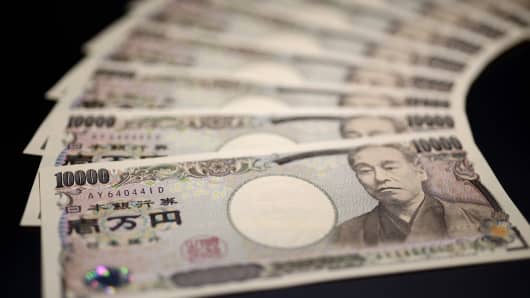Contrary to expectations, the Bank of Japan's boldest steps yet to boost a flagging economy have triggered a swift change in course for a falling yen, which overnight saw its biggest one-day rise against the U.S. dollar in eight months.
And, some foreign exchange strategists believe the downward move in the safe haven currency – which has depreciated 11 percent against the greenback in the past three months – is now likely to pause.
Since Japan's central bank announced on Tuesday it would double its inflation target to 2 percent and commit to an open-ended asset purchase program starting in 2014, the yen has strengthened over 1 percent against the U.S. dollar. The country's benchmark Nikkei 225 stock index meanwhile closed down 0.4 percent on Tuesday and continued its fall on Wednesday.
(Read More: BOJ Pledges to Buy Assets; 'Yes' to 2% Inflation Target)
According to Kathy Lien, managing director of FX strategy for BK Asset Management, this is because, "on the surface, the Bank of Japan made some dramatic changes to monetary policy but the details of their decision were far less aggressive."
"When sentiment is so skewed, the potential of disappointment is also very high and by under delivering, the BOJ killed the rally in dollar-yen, for now," she added.
The impetus behind the rapid fall in the yen since November and a 18 percent gain in Japanese shares has been an expectation that the BOJ would deliver an aggressive monetary policy following pressure from the new government, which has promised to revive the Japanese economy.
(Read More: Germany's Central Bank Head Slams Japan's Yen Policy )
Experts say the biggest letdown was the central bank's commencement date for its unlimited asset purchases.
"Japan won't be getting any additional stimulus this year as the central bank keeps current asset purchases intact for 2013 and that's bad news for Japan and dollar-yen, after enjoying a very nice rally over the past 2 months," Lien said.
Another disappointing aspect of the BOJ's monetary policy, was the central bank's revision to its consumer price index (CPI) target, said Lien. The BOJ upgraded its forecasts for CPI in 2014 by 0.1 percent to 0.9 percent.
This means BOJ policymakers believe their open-ended asset purchase program will only boost inflation by 0.1 percent next year, she noted.
"So realistically, 2 percent inflation probably won't be achieved until 2015 or 2016 at the earliest," Lien said, adding that the fact the BOJ did not provide a time frame for achieving the inflation target reflects a lack of confidence among policymakers in achieving their goal.
Greg Gibbs, senior FX strategist RBS agreed that the conditions set around the inflation target were unsatisfactory.
"The inflation target was fully expected. Perhaps it disappoints, however, with the caveats and lack of ownership by the BOJ, and no formal arrangement for review by the government," he said.
Range-Bound Yen
While Gibbs expects a further correction in the dollar-yen over the next day or two, given the recent run-up, he forecasts it will trade in a range of 87-95 in the medium-term. The yen stood at about 88.65 to the dollar on Wednesday.
A move towards 87 for the yen against the dollar is more likely, before further depreciation in the second quarter, he said.
Further yen weakness will come about as Shinzo Abe's Liberal Democratic Party (LDP) continues its jawboning about the need for more action and a weaker currency, Gibbs noted.
"Abe still has several aces up his sleeve. He will have a big say in the next BOJ governor and deputies. He clearly thinks a weaker yen is required to fire up nominal economic growth and he will make this happen," Gibbs added.
BOJ Governor Masaaki Shirakawa's term expires in April and the appointment of his successor is in the spotlight given the renewed push to kick start an economy in recession.
(Read More: What's Next on the List for BOJ )
Over the longer-term, Bob Iaccino, chief market strategist at Topstep Trader said he is maintaining his bearish call on the currency, forecasting it to touch 100 in the next 6-18 months.
According to Iaccino, a continued weakening of the yen is inevitable, "the inflation target, to me, is a policy excuse for any number of future yen printing programs."



